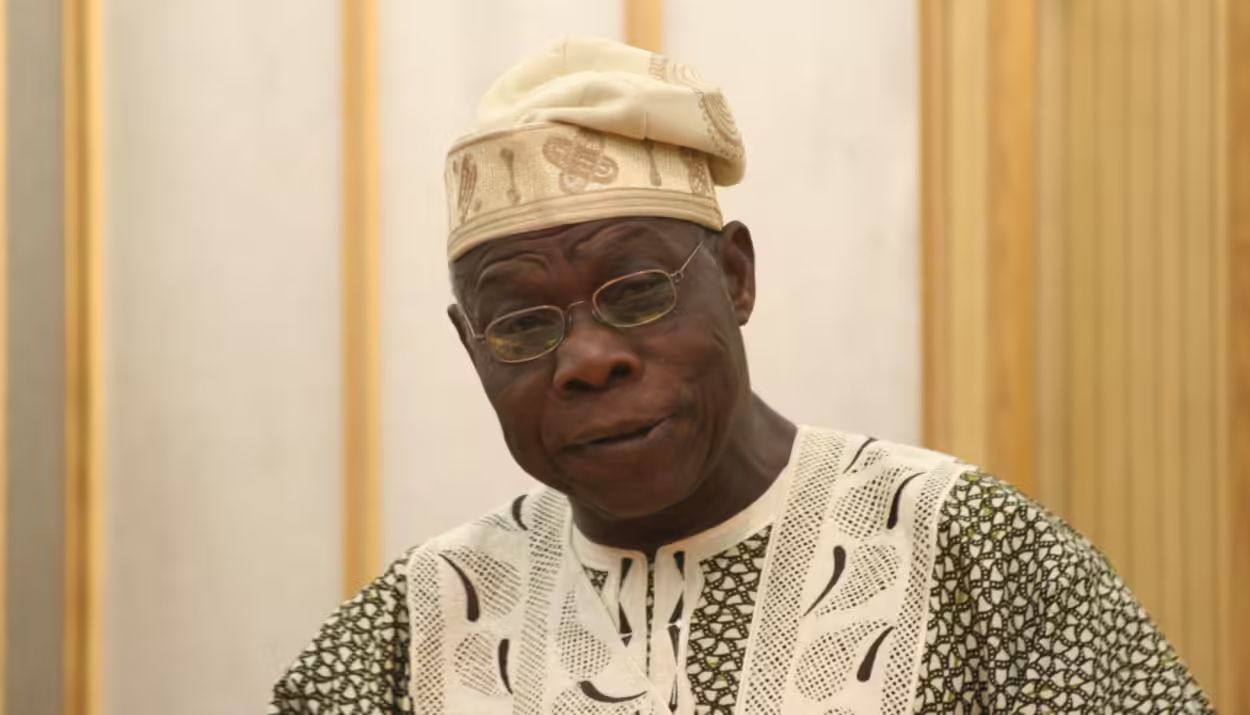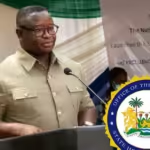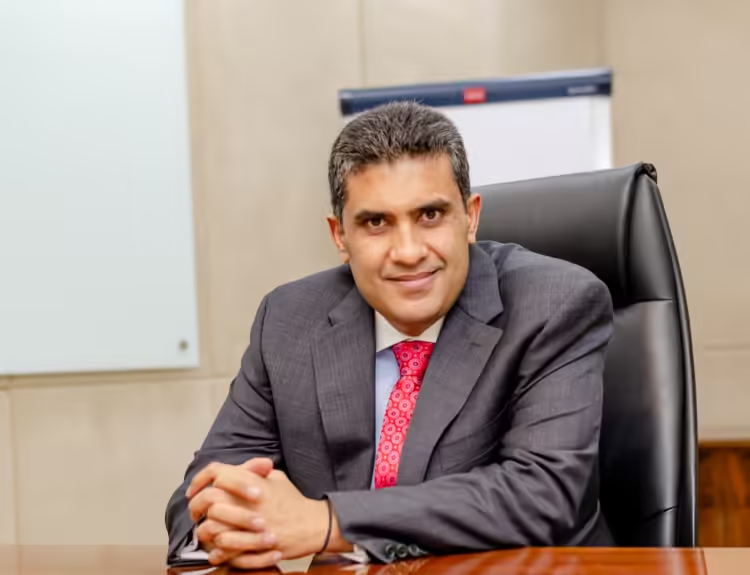Olusegun Obasanjo, the former president of Nigeria, is as much a cultural icon as he is a political figure. He is famously known for his Ankara outfits paired with matching traditional hats which he prefers to conventional suits. This bold statement makes him stand out especially when he’s photographed alongside other world leaders. Born on March 5, 1937 in Abeokuta, Ogun State, Nigeria, Obasanjo has had a remarkable political journey, serving first as a military president from 1976 to 1979 and later as a civilian leader from 1999 to 2007.
He admits that he sometimes wears thermal undergarments beneath his Ankara regalia to combat the chilly weather. Passionate about preserving traditional practices, he highlights the decline of wearing animal skins, asserting that our cultural heritage is the essence of who we are. “Reclaiming these traditions is vital to preserving our identity,” he once said.
Contents
A close call
Talk of a lucky case of mistaken identity. Obasanjo narrowly escaped assassination because another general was mistaken for him and killed in his place. He supported a coup led by Murtala Mohammed, a military general. In February 1976, General Murtala Mohammed, the then-Head of State, was assassinated in an attempted coup, putting Olusegun Obasanjo who was Murtala’s deputy at great risk. The plotters were targeting leaders within Murtala’s inner circle including his deputy, Olusegun.
This fortunate case of mistaken identity ultimately saved his life. Just weeks later, he was sworn in as Nigeria’s new leader, taking on the noble task of steering the country through this chaotic period as Murtala’s successor. It’s a story he often shares, serving as a reminder of how sometimes the shadows of danger could lead us to unforeseen opportunities.
Forged in military discipline
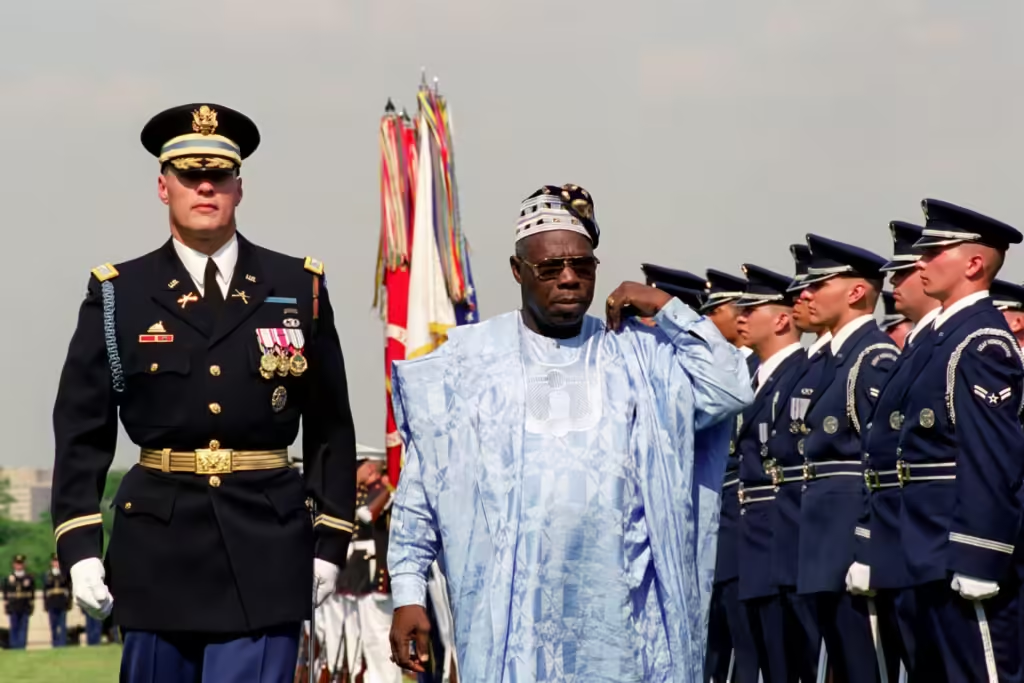
Pledging to honor General Murtala Mohammed’s vision of establishing a civilian government, Obasanjo made history in 1979 by handing power over to a civilian administration. This is considered a remarkable milestone, as it was the first time an African military leader willingly transferred authority to a civilian government. His voluntary handing over of power earned him widespread credibility and admiration across Africa and on the international stage.
During his presidency, he focused on improving the economy, launching initiatives to boost agriculture and improve the oil sector. This pivotal moment paved the way for Shehu Shagari who became the first civilian president after 13 years of military rule. Obasanjo firmly believes in the principles of democracy, emphasizing that a nation with over 350 ethnic groups requires a government that fosters participation, debate and dialogue. He argued that only through democracy can such a diverse society truly thrive.
Olusegun came from humble beginnings. His father, Amos Adigun Obaluayesango Obasanjo, was a farmer while his mother, Bernice Ashabi Bankole, worked as a small-scale trader. As a proud member of the Yoruba ethnic group, one of Nigeria’s major cultural communities, Obasanjo’s roots run deep. His formal education began at Baptist Day School in Abeokuta where he laid the foundation for his academic journey.
He then advanced to the prestigious Baptist Boys’ High School in Abeokuta, renowned for nurturing prominent Nigerian leaders including Chief M.K.O. Abiola who later became his political ally. At just 21, he made a significant leap by joining the Nigerian Army in 1958. He soon headed to England to attend Mons Officer Cadet School for further military training. In the 1960s, his quest for knowledge took him to the Defence Services Staff College in India. Later in his career, he enhanced his strategic insight at the National Institute for Policy and Strategic Studies (NIPPS) in Nigeria.
Olusegun Obasanjo’s family life is somewhat unclear as it is marked by multiple marriages and numerous children. He married his first wife, Esther Oluremi Akinlawon, in 1963 and together they had several children before their eventual separation. His second wife, Lynda Obasanjo, was tragically killed in a carjacking incident in 1987. Stella Abebe, perhaps his most well-known spouse, served as Nigeria’s First Lady during his presidency from 1999 until her passing on in 2005.
Following her, Mojisola Adekunle became his wife and ventured into politics even founding her own political party before her death in 2009. Obasanjo has at least 20 children from these relationships with some notable figures among them. Iyabo Obasanjo Bello has made her mark in politics as a senator while Olumuyiwa Obasanjo has pursued a successful career in engineering. Dare Obasanjo, a tech professional based in the United States, has worked with renowned companies like Microsoft.
A prison sentence
In 1983, Nigeria slipped back under military rule, starting a dark chapter in its history. Things got even worse under General Sani Abacha whose rule from 1993 to 1998 was marked by fear and repression. Obasanjo, who had once helped Nigeria move toward democracy, spoke out against Abacha’s abuses and refused to back down.
His bold stance led to his arrest in 1995 on accusations of plotting a coup. For three difficult years, he endured prison. Then, in 1998, Abacha died unexpectedly leading to Obasanjo’s release. His resilient spirit never relented as he ran in the 1999 elections winning the election and led the country back to civilian rule. This finally closed the door on years of military dictatorships.
He was re-elected in 2003, though both elections came under fire with allegations of fraud and attracting criticism from Nigerians and international observers alike. Despite these controversies, Obasanjo was widely seen as a “safety first” leader—not a political or economic mastermind but steady, practical, and with a valuable network of global connections that would be helpful for Nigeria.
His presidency provided the much-needed stability and he was recognized for helping restore democracy to a country that had endured years of military rule. Early in his presidency, the economy grew at about 3-4%. By the mid-2000s, Nigeria’s growth surged reaching rates of 6-7% per year. This was partly driven by rising oil prices and increased foreign investment. In April 2007, he stepped down as planned after the April elections handing over to his successor, Umaru Musa Yar’Adua, in a peaceful transfer of power.
An African diplomat
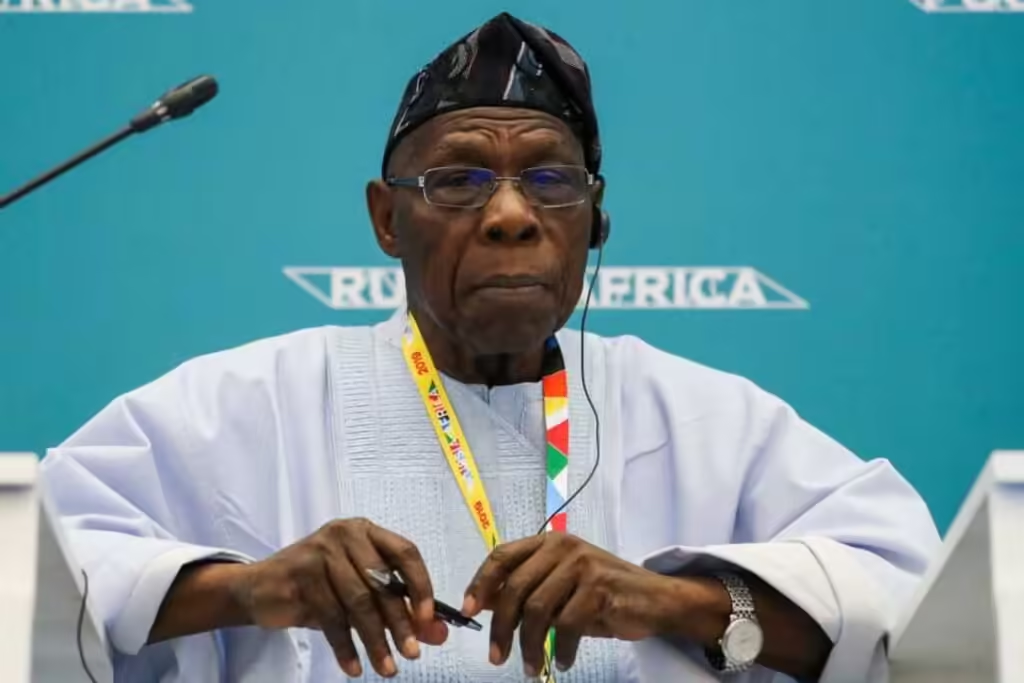
Between July 2004 and January 2006, he served as chairperson of the African Union. In addition to this influential role, he chaired the Commonwealth Heads of Government Meeting where leaders from various nations collaborated on pressing global issues. His leadership extended to heading the African Heads of State and Government Implementation Committee on NEPAD, a program designed to enhance economic growth and development in Africa.
Olusegun Obasanjo also contributed to the African Progress Panel which focused on monitoring and promoting sustainable development. He became known for advocating debt relief and strengthening democratic institutions in Africa. His reputation for leadership and diplomacy culminated in his appointment in 2008 by the then United Nations Secretary-General, Ban Ki-moon, as his special envoy on the Great Lakes. This highlighted his importance in addressing regional issues and promoting peace. Through these efforts, Obasanjo has left a significant mark on African politics and development.
He has been widely consulted on the democratic elections of countries across the African continent. As an election observer, he has traveled to nations like his native Nigeria in 2015, Ghana in 2016 and Liberia in 2017 where he called for credible electoral processes. He has become a trusted voice in promoting fair elections across Africa by working with the African Union and ECOWAS since the early 2000s.
His advice has been sought by many countries aspiring to hold credible and transparent elections. In each of these roles, Obasanjo has championed the idea that democracy thrives on transparency and integrity. His work has helped people trust their electoral systems by reinforcing the belief that every person’s vote counts. With every election he oversees, he plays a key part in fostering the principles of democracy.
Olusegun Obasanjo is also renowned for his active role in peacekeeping and conflict resolution throughout Africa. Over the years, he has been involved in resolving conflicts in countries like South Sudan, the Democratic Republic of the Congo, and the Central African Republic where he worked tirelessly to foster dialogue among warring factions. He also played a crucial role in international mediation efforts in Namibia, Angola, South Africa, Mozambique and Burundi during the 1990s, helping to pave way for lasting peace agreements.
In 2021, he was appointed as the African Union’s special envoy for the Tigray conflict in Ethiopia. In this role, he aimed to facilitate dialogue and promote stability in a region grappling with turmoil. Obasanjo’s unwavering dedication to resolving conflicts not only addresses immediate crises but also inspires a broader movement toward reconciliation across Africa, demonstrating the power of dialogue in overcoming deep-rooted issues.
He has authored a number of influential and thought-provoking books. In My Command published in 1980, he recounts his experiences during Nigeria’s Civil War, providing a glimpse of how it took a toll on the country. Later in Not My Will (1990), he reveals personal and political reflections, highlighting on the challenges he faced as a leader. In 2014, he published My Watch, an ambitious three-part memoir where he lays bare his years as president and his views on Nigerian politics.
Then in Africa Through the Eyes of a Patriot (2017), he dives into the chronicle of African politics, sharing insights and calling for stronger leadership across the continent. That same year, he co-authored Making Africa Work: A Handbook, together with Greg Mills, Jeffrey Herbst, and Dickie Davis to create a guide on transforming Africa’s economies. Through each book, Obasanjo not only tells his story but also challenges Africa to push forward.
He has founded Olusegun Obasanjo Presidential Library (OOPL) which is vast and one of its kind. It mirrors the model of American presidential libraries. OOPL remains a unique library in Nigeria and the first of that kind in the whole of the African continent.It is a groundbreaking project that stands as Africa’s first presidential library, mirroring the esteemed model of American presidential libraries. This institution serves as a testament of Obasanjo’s legacy, housing a permanent exhibition of his life history and presidency in Nigeria.
The library is more than just a repository of historical books. This is.because it features various segments that enrich the visitor experience including an African Fabrics Centre where the continent’s rich textile heritage is celebrated and an Olusegun Obasanjo Bookshop which offers a selection of literature. Additionally, OOPL boasts a church, a mosque and an amphitheater thus promoting inclusivity and respect for diverse faiths. Visitors can also enjoy a carousel, a conference center, a hotel, and even a zoo, making the library a spectacular hub of learning and leisure.
Olusegun Obasanjo Networth
Obasanjo has an estimated net worth of $1.5 billion earned through various business ventures and investments over the years. One of his primary sources of wealth is Obasanjo Farms Nigeria Limited established in 1979. It operates across a number of locations in Nigeria and is a significant player in livestock, poultry, and fish farming. In addition to that, Obasanjo has invested in real estate, owning several properties both in Nigeria and abroad although specific details are not widely documented.
Olusegun Obasanjo influence in the oil sector during his presidency from 1999 to 2007 also enhanced his financial portfolio although the nature of his current holdings is limited. Additionally, his wealth has also been contributed by the sale of his books. He also offers consultancy services that capitalize on his vast experience in governance and diplomacy.
Retirement
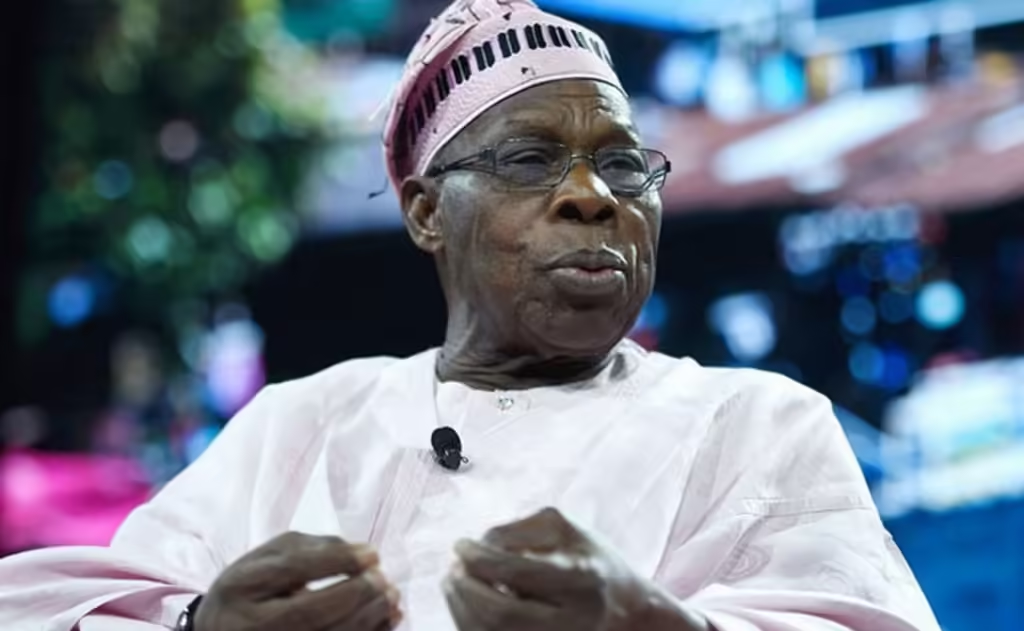
Retirement to his home in Abeokuta seems not to be Olusegun Obasanjo’s only option as he remains deeply engaged in political discourse within Nigeria and across Africa. Known for his outspoken nature, Obasanjo has frequently voiced concerns over governance issues. In 2013, for instance, he addressed an open letter to President Goodluck Jonathan criticizing the government’s response to the insurgency of Boko Haram, an extremist group responsible for widespread terror attacks in Nigeria.
His concerns centered around the government’s lack of urgency and effective action in addressing the security crisis. Five years later, in 2018, Obasanjo issued a strong rebuke to President Muhammadu Buhari urging him not to seek re-election. He highlighted economic mismanagement and security concerns. Beyond Nigeria’s borders, Obasanjo has not hesitated to critique other African leaders such as Zimbabwe’s former president Robert Mugabe by calling for greater democracy and transparency in his government.
A humorous moment that recently caught media attention was when Olusegun Obasanjo playfully pushed aside a stepping platform exclaiming “I’m not short!” This light moment reflected his authoritative yet warm personality. Beyond the jokes, Obasanjo has also been vocal about the recent anti-government protests in Kenya led by the GenZs.
He emphasized, “Youth must be given the space to express their concerns and aspirations.” He urged governments to listen to the voices of the younger generation that is seeking change. Additionally, he has backed Raila Odinga in his bid for the chairmanship of the African Union Commission praising Raila’s commitment to peace and development. He stated, “Raila has consistently advocated for unity and progress in Africa.”

